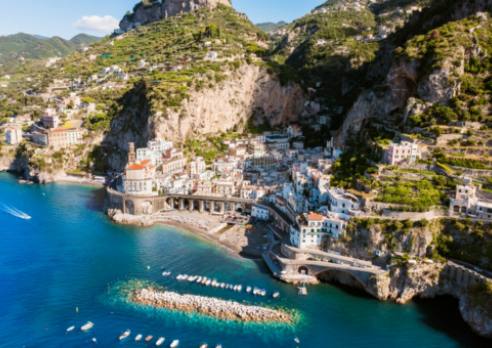Nestled along the breathtaking cliffs of the Amalfi Coast lies a region rich in history, culture, and culinary traditions that have been passed down through generations. Influenced by Greek and Roman civilizations, the cuisine of the Amalfi Coast is a delightful blend of ancient recipes and local ingredients that have stood the test of time. From the sun-kissed lemons that flourish in the region to the time-honored dishes cooked in monastery kitchens, the flavors of the Amalfi Coast offer a taste of history unlike any other. Join us as we delve into the ancient culinary secrets of this enchanting coastal paradise.

The Influence of Greek Cuisine on the Amalfi Coast
The Amalfi Coast has a rich culinary history that can be traced back to its Greek roots. The influence of Greek cuisine can be seen in the traditional dishes of the Amalfi Coast, such as seafood dishes and the use of fresh and local ingredients. The Greeks introduced olive oil, olives, and wine production to the area, which are still staples in Amalfi Coast cuisine today. Additionally, the Greeks also introduced the practice of using herbs and spices to enhance the flavor of dishes, a tradition that continues to be an important part of Amalfi Coast cooking. Overall, the influence of Greek cuisine on the Amalfi Coast is undeniable and continues to be an important part of the region's culinary identity.
The Role of Roman Ingredients in Modern Amalfi Coast Dishes
Roman cuisine has had a profound influence on the culinary traditions of the Amalfi Coast, shaping the ingredients and flavors that define modern dishes in the region. From the use of olive oil and fish to the incorporation of herbs and spices, the legacy of Roman cooking can be seen in every bite of Amalfi Coast cuisine. The Romans also introduced a variety of fruits and vegetables to the area, including tomatoes, peppers, and eggplants, which have become staples in traditional dishes such as Caprese salad and melanzane alla parmigiana. Additionally, the practice of preserving food through techniques like salting, curing, and pickling, which the Romans favored, continues to be a common practice in Amalfi Coast cooking today.
Uncovering Ancient Recipes from Amalfi Coast Monasteries
Throughout history, the monasteries of the Amalfi Coast have played a significant role in the preservation and creation of unique culinary recipes. These monasteries served as centers of learning and culture, where monks and nuns would cultivate and experiment with various ingredients to create delicious and innovative dishes. The recipes that have been passed down through generations offer a glimpse into the rich culinary heritage of the Amalfi Coast, showcasing the creativity and ingenuity of the monks and nuns who once inhabited these monasteries. Through uncovering these ancient recipes, we are able to connect with the past and experience the flavors and techniques that have shaped the cuisine of the Amalfi Coast over centuries.
The Evolution of Lemon Farming in Amalfi: From Antiquity to Today
Lemon farming has been a tradition in the Amalfi Coast for centuries, with its origins dating back to antiquity. The unique climate and fertile soil of the region have made it the ideal setting for cultivating lemons, and the practice has evolved over the years to become a prominent aspect of the local economy.
In ancient times, lemons were prized for their medicinal properties and were used in various recipes and herbal remedies. Lemon trees were carefully tended to by farmers, who understood the importance of proper cultivation techniques in ensuring a bountiful harvest. As the demand for lemons grew, so too did the production methods, with farmers adopting new technologies and practices to increase efficiency and yield.
One of the most significant developments in lemon farming in the Amalfi Coast was the introduction of terraced farming on the steep cliffs overlooking the Mediterranean Sea. This innovative technique allowed farmers to maximize the use of limited land and capture the full benefits of the region's sunny climate. Today, these terraced lemon groves are a defining feature of the Amalfi landscape, attracting visitors from around the world.
The cultivation of lemons in the Amalfi Coast has also played a crucial role in preserving traditional agricultural practices and supporting local communities. Many farmers continue to grow lemons using organic methods, eschewing chemicals and synthetic fertilizers in favor of sustainable, environmentally friendly practices. This commitment to preserving the land and maintaining the quality of the produce has allowed the Amalfi Coast to retain its reputation as a leading producer of high-quality lemons.
Overall, the evolution of lemon farming in the Amalfi Coast reflects the region's rich agricultural heritage and its ongoing commitment to sustainability and tradition. As visitors explore the picturesque lemon groves and sample the region's famous limoncello liqueur, they are not only experiencing a taste of history but also supporting the continued success of local farmers and the preservation of this ancient culinary tradition.
